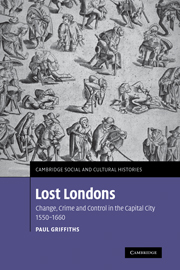Book contents
- Frontmatter
- Contents
- Maps and tables
- Abbreviations
- Preface
- Introduction: Rhetorics and records
- Part I Change
- Part II Crime
- Part III Control
- 6 Court days
- 7 Bodies
- 8 Policing: people and policy
- 9 Policing: night battles
- 10 Policing: process and prosecution
- 11 Policing: knowledge
- Conclusion
- Appendix
- Bibliography
- Index
10 - Policing: process and prosecution
Published online by Cambridge University Press: 15 December 2009
- Frontmatter
- Contents
- Maps and tables
- Abbreviations
- Preface
- Introduction: Rhetorics and records
- Part I Change
- Part II Crime
- Part III Control
- 6 Court days
- 7 Bodies
- 8 Policing: people and policy
- 9 Policing: night battles
- 10 Policing: process and prosecution
- 11 Policing: knowledge
- Conclusion
- Appendix
- Bibliography
- Index
Summary
Crimes with and without victims
There is currently a lack of balance in work on policing and prosecution in the early modern period. In a nutshell, it tips too heavily towards the efforts of private people. Time after time we are told that the private prosecutor was the ‘central agent’, ‘backbone’, or ‘mainstay’ of criminal justice. ‘Private prosecution’ was ‘the paradigm case’ before the Metropolitan Police Act (1829). John Beattie argues that the judicial system's ‘capacity to discover, arrest, and prosecute offenders’ was ‘entirely undeveloped’ as late as 1700, and detective work was ‘left to the public’ and ‘efforts of victims’. Other scholars couple the leading role of private prosecutors with part-time police-work to argue that policing was shoddy four centuries ago. Gaskill, for one, writes that the ‘criminal law depended on informal and amateur policing, privately initiated suits, and trials by jury, [and] as a consequence its enforcement was often random, inefficient, and unfair’. Constables often appear as less important than neighbours or victims who, it is said, took the leading roles in clearing up crime in the sixteenth and seventeenth centuries. Indeed, some scholars link a decline in the involvement of ‘private’ citizens in policing to an increase in the role played by ‘public’ officers. A ‘gradual professionalization’ of policing over the course of the eighteenth century and after was partly made possible by a significant drop in ‘active community involvement’. Constables appear less active or effective when neighbours are thought to have taken the lead.
- Type
- Chapter
- Information
- Lost LondonsChange, Crime, and Control in the Capital City, 1550–1660, pp. 361 - 399Publisher: Cambridge University PressPrint publication year: 2008

